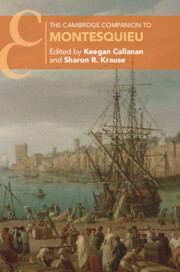Book contents
- The Cambridge Companion to Montesquieu
- Other Volumes in the Series of Cambridge Companions
- The Cambridge Companion to Montesquieu
- Copyright page
- Contents
- Contributors
- Acknowledgments
- Chronology
- Abbreviations
- 1 Montesquieu
- 2 Persian Letters
- 3 Considerations on the Romans
- 4 The Spirit of the Laws
- 5 Montesquieu and the Classical World
- 6 Montesquieu’s Guiding Principles and Foundations
- 7 Montesquieu on Virtue
- 8 Internationalism, Cosmopolitanism, and Empires
- 9 Liberty in Montesquieu
- 10 Political Sovereignty in Montesquieu
- 11 Montesquieu on Slavery
- 12 Montesquieu and the Liberty of Women
- 13 Political Economy
- 14 Religion and Politics
- 15 Constitutional History
- 16 Montesquieu and the Enlightenment
- 17 Montesquieu’s Liberal Legacies
- Bibliography
- Index
- Other Volumes in the Series of Cambridge Companions
3 - Considerations on the Romans
Published online by Cambridge University Press: 23 February 2023
- The Cambridge Companion to Montesquieu
- Other Volumes in the Series of Cambridge Companions
- The Cambridge Companion to Montesquieu
- Copyright page
- Contents
- Contributors
- Acknowledgments
- Chronology
- Abbreviations
- 1 Montesquieu
- 2 Persian Letters
- 3 Considerations on the Romans
- 4 The Spirit of the Laws
- 5 Montesquieu and the Classical World
- 6 Montesquieu’s Guiding Principles and Foundations
- 7 Montesquieu on Virtue
- 8 Internationalism, Cosmopolitanism, and Empires
- 9 Liberty in Montesquieu
- 10 Political Sovereignty in Montesquieu
- 11 Montesquieu on Slavery
- 12 Montesquieu and the Liberty of Women
- 13 Political Economy
- 14 Religion and Politics
- 15 Constitutional History
- 16 Montesquieu and the Enlightenment
- 17 Montesquieu’s Liberal Legacies
- Bibliography
- Index
- Other Volumes in the Series of Cambridge Companions
Summary
This chapter clarifies the philosophic dimension of Montesquieu’s essay on Rome, which comes to sight when, in chapter 18, Montesquieu makes explicit that he is presenting here a preeminent case study vindicating the contention that “it is not Fortune that dominates the World”; there are “general causes, some moral, some physical, which operate,” and “all the accidents are subject to these causes.” This foreshadows the claim with which Montesquieu opens his Spirit of the Laws: “I have posed the principles, and I have seen the particular cases unfold therefrom as if by themselves; the histories of all the nations are nothing but the consequences.” These statements signal the emergence of the modern philosophy of history, as a major component of Enlightenment rationalism’s most ambitious project and hope: to show that human reason can provide a system of universal causal explanation that will leave no room for plausible evidence of governance by supra- and contra-rational providential and legislative divinity (which is profoundly opposed not only to revealed religion but to ancient political rationalism.)
Keywords
- Type
- Chapter
- Information
- The Cambridge Companion to Montesquieu , pp. 35 - 53Publisher: Cambridge University PressPrint publication year: 2023

